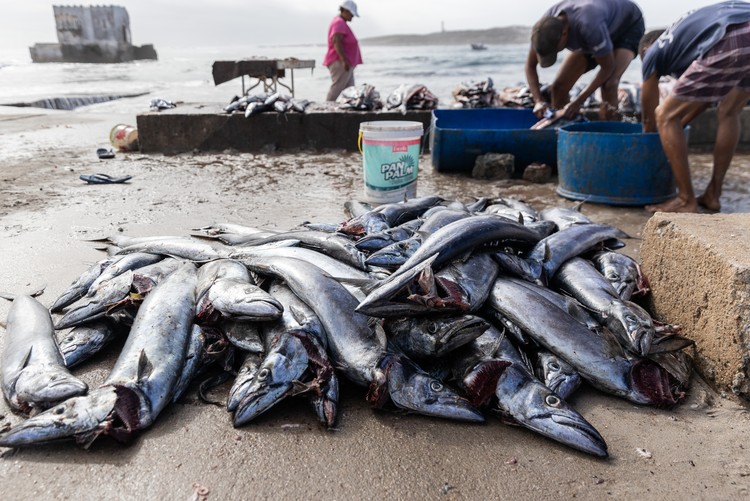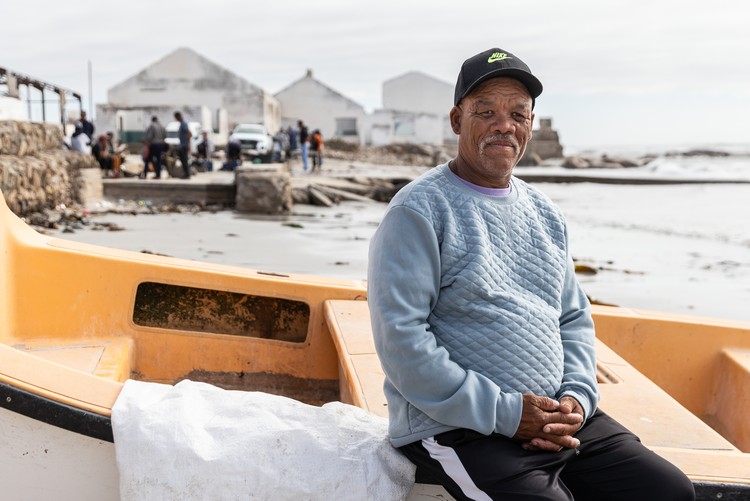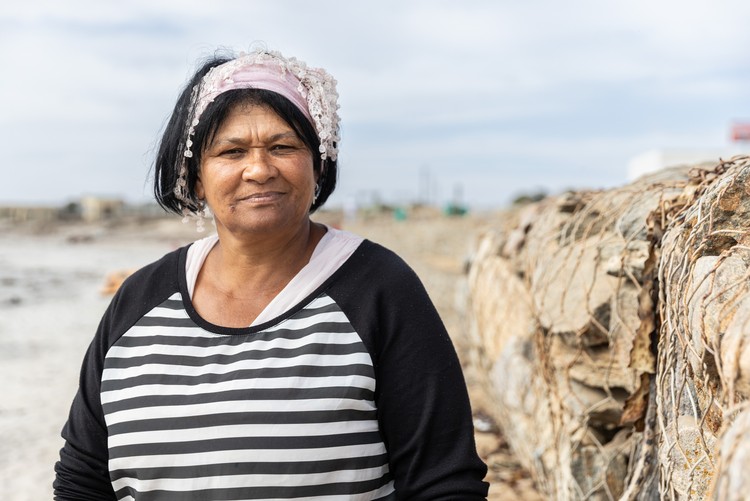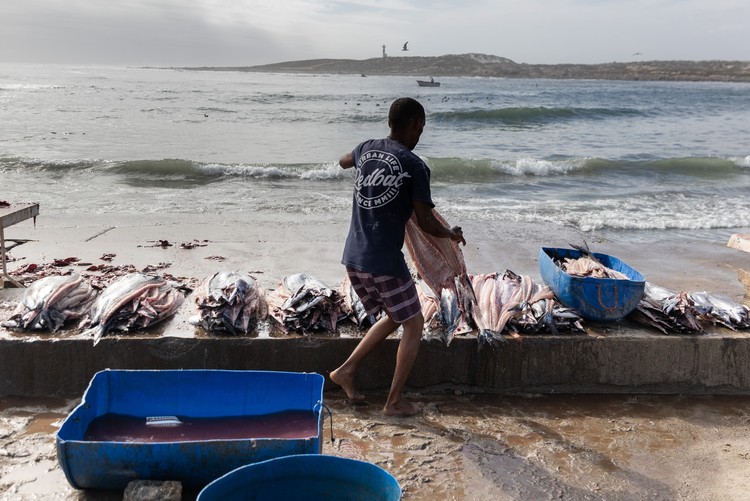Police and soldiers deployed to tiny West Coast fishing village
Controversial boat quotas to be reconsidered after meeting with Hondeklip Bay fishers, says fisheries department
Snoek on the beach at Hondeklip Bay. Fishers are angry that they do not have vessel permits for linefish. Photos: Ashraf Hendricks
- The Department of Forestry, Fisheries, and the Environment (DFFE) has promised to reconsider the controversial allocation of linefish boat permits.
- This follows a meeting with fishers in Hondeklip Bay last week.
- The meeting came after police officers and soldiers were deployed to the West Coast beach about two weeks ago.
- Fish were confiscated from fishers and fines were issued.
Daniel Ruiter is a professional fisher but, like many of the other 12,000 small fishers in the country, he does not have a permit to catch linefish from his boat. So he got a recreational permit. But when he and other fishermen came out of the water at Hondeklip Bay on 15 March, they found police and soldiers waiting for them.
In terms of the small-scale fishing rights process finalised in November last year, Ruiter is recognised as a small-scale fisher. But he has no right to catch linefish from his boat, because he and the other Hondeklip Bay fishers do not have permits for their vessels. The Department of Forestry, Fisheries, and the Environment (DFFE) has granted just 377 vessel permits for the small-scale fishing sector for linefish and fishers say this is not enough.
The decision is being challenged. In the meantime, Ruiter and the other Hondeklip Bay fishers have been fishing with recreational permits.
But on 15 March, when they brought in their boats they found officials of the DFFE, police, and members of the South African National Defence Force waiting to check their catch. Snoek was confiscated and fines were issued.
Videos of the officers and soldiers deployed on the beach have been circulating on social media. There was “panic and fear”, says ward committee member Carisa Soudens, who has written to the DFFE asking for an apology and a meeting to discuss the rights of the fishers.
Hondeklip Bay is a small community about 90km north of Garies on the West Coast of the Northern Cape. It has a population of a few hundred people that relies a lot on fishing.
Daniel Ruiter has been fishing for about 45 years.
The DFFE’s action was “unacceptable”, said Ruiter. “They must come sit with us,” he said.
Ruiter has been a fisher for about 45 years. His father and his uncles were all fishermen. “I make my living out of the sea,” Ruiter said.
DFFE spokesperson Peter Mbelengwa said the DFFE control officer had confiscated “excess fish” after finding that several vessels on the slipway had exceeded the daily catch limit for recreational fishing.
SAPS, with support from the SANDF, had responded when members of the public started protesting against the fish being confiscated, he said.
The following day, on 16 March, the fishery control officer and SAPS had inspected the incoming vessels again but no fish had been confiscated or fines had been issued, he said. Mbelengwa said no-one was prevented from going onto the beach or from going to sea.
“The enforcement activities were not aimed at preventing legitimate permit holders from fishing, but were intended to prevent illegal catches, precisely aimed at ensuring that the legitimate and legal fishers are not adversely affected by illegal operators,” he said.
Ward committee member Carisa Soudens says the Hondeklip Bay community relies on linefish.
Small-scale fishers have complained that the allocation of 377 vessels is far from enough for the nearly 12,000 recognised small-scale fishers.
The decision to cut the number of vessels “will cripple our fisher community”, Soudens said in her letter to the DFFE. “Our community relies on linefish to keep us going for most of the year,” she said.
Without more vessels, the small-scale fishing right “means nothing,” Ruiter said.
Mbelengwa said that after a meeting with the Hondeklip Bay cooperative on 27 March, the DFFE would “consider the requests made by several cooperatives for an increase in their linefish vessel allocations”.
He said the department would respond to the cooperatives’ concerns within two weeks.
A Hondeklip Bay fisher guts and scales the fish.
Next: People struggle to get IDs at Khayelitsha Home Affairs as elections loom
Previous: Cape Town commuters return to Southern Line as service improves
Letters
Dear Editor
It is a widely held opinion that the Department of Fisheries does not care about the small commercial fishermen (and this includes women) but only large scale fishers.
Many people have questioned whether the senior officials in the Department of Fisheries and ANC government top brass are not receiving "kickbacks" from certain of the larger commercial fishing companies and operators, and from trawlers that are well known for sneaking in close to the coast at night and reaping our shoreline of huge harvests of fish. Good investigative journalists need to explore whether this is indeed the case - there is probably a trail of corruption there somewhere!
The 12,000 fishermen along our coast are primarily line fishermen or small scale operators, and although some maritime abuse of the fish stock occurs amongst them along our coastline, the far bigger problems are the large scale operators and foreign trawlers. Once again, the small operators are being marginalized in favour of the big operators. Is it not a constitutional right to work? Many of these fishermen have been doing so for years, and now all of a sudden they must stop doing so?
Dear Editor
What a waste of our security resources!
In a country with a daily murder/rape rate amongst the highest in the world, it is deemed necessary to deploy the SANDF and SAPS against citizens trying to make a traditional living! Use them in combating the real crime in this country - there is lots to choose from.
Dear Editor
We are wasting our resources of police and soldiers to cut off the fishermen's main source of income, something that has been passed down from generation to generation. These are not the guys destroying our oceans: it is the huge companies, the likes of Sea Harvest, etc. that needs to be monitored. The prices of their fish is marked up so high and it isn't even fresh fish.
Why is the government allowing these huge companies to take away the livelihood of these fishermen? This issue has been going on for years, why can they not meet halfway at least?
Dear Editor
With so many serious high-level criminal and corruption issues to be tackled in SA, the focus on and enforcement of these local policies by SAPS and the military comes across as bullying.
It seems unusual to have the SANDF called in to confront a few local fishermen. Who was responsible for this on a government level?
Can anyone reading this article suggest a practical way forward that will allow line quotas for the local fishermen to be adjusted? Election time is nearly on us, could this be used somehow?
Dear Editor
The "powers" of justice are directed at all the wrong targets. Begin by cleaning all the corruption inhouse, i.e. police, government employees, ALL municipal departments... Instead they use valuable time and resources targeting innocent people desperately trying to etch a living in these horrific economic times. Totally unacceptable and disgusting.
© 2024 GroundUp. This article is licensed under a Creative Commons Attribution-NoDerivatives 4.0 International License.
You may republish this article, so long as you credit the authors and GroundUp, and do not change the text. Please include a link back to the original article.
We put an invisible pixel in the article so that we can count traffic to republishers. All analytics tools are solely on our servers. We do not give our logs to any third party. Logs are deleted after two weeks. We do not use any IP address identifying information except to count regional traffic. We are solely interested in counting hits, not tracking users. If you republish, please do not delete the invisible pixel.






